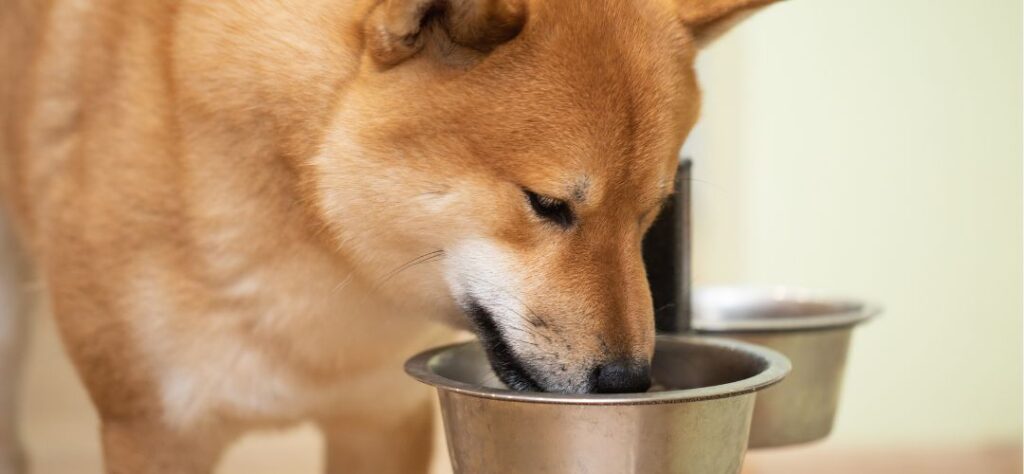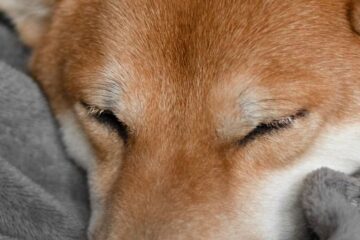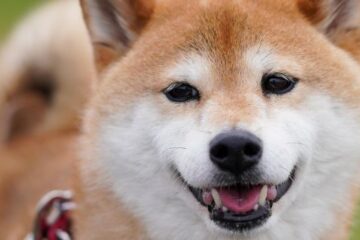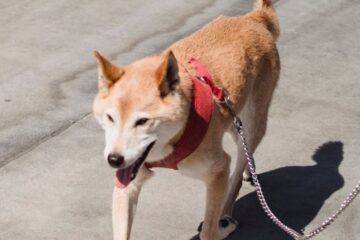Introduction to Shiba Inu Puppy Diet and Nutrition
Feeding your Shiba Inu puppy the right food is crucial for their growth, health, and happiness. In this guide, we’ll explore the importance of a balanced diet and the specific nutritional needs of a Shiba Inu puppy.
-
- Importance of a Balanced Diet for Shiba Inu Puppies
A balanced diet is the cornerstone of your Shiba Inu puppy’s health. It ensures they get the right mix of proteins, carbohydrates, fats, vitamins, and minerals. According to Wikipedia, puppies require a diet rich in energy, as they are typically more active than adult dogs. A balanced diet also supports their immune system, promotes healthy skin and coat, and aids in digestion. Without it, your Shiba Inu puppy could face health issues like obesity, poor bone development, and a dull coat.
-
- Understanding the Nutritional Needs of a Shiba Inu Puppy
Shiba Inu puppies have unique nutritional needs. They require a higher protein content to support their rapid growth and development. According to the National Research Council, puppies should get about half of their energy from protein. They also need a good balance of fats for energy and a variety of fruits and vegetables for essential vitamins and minerals. It’s important to consult with your vet to understand the specific nutritional needs of your Shiba Inu puppy.
Remember, feeding your Shiba Inu puppy the right diet is an investment in their future health. With the right nutrition, your puppy can grow into a healthy, happy, and active adult dog.
Understanding Shiba Inu Nutritional Needs
Just like humans, Shiba Inu puppies have specific nutritional needs to grow healthy and strong. One of the most important nutrients for these adorable pups is protein. Let’s delve into why protein is so essential and where to find the best sources of it for your Shiba Inu puppy.
Protein Needs for Shiba Inu Puppies
-
- Why protein is essential for Shiba Inu puppies
Protein is the building block of life. It’s crucial for the growth and development of all puppies, including Shiba Inus. Protein helps to build strong muscles, support the immune system, and promote healthy skin and coat. According to Wikipedia, puppies require about twice the amount of protein as adult dogs. This is because they are growing and developing rapidly.
-
- Best sources of protein for Shiba Inu puppies
There are many excellent sources of protein for your Shiba Inu puppy. These include chicken, turkey, beef, fish, and eggs. It’s important to choose high-quality, lean sources of protein to ensure your puppy gets the nutrients they need without unnecessary fats. Some high-quality dog foods also contain added protein to meet your puppy’s needs.
Remember, every Shiba Inu is unique and may have different dietary needs. Always consult with your vet to create a diet plan that suits your puppy’s specific needs and lifestyle.

Carbohydrate Needs for Shiba Inu Puppies
Just like humans, Shiba Inu puppies require a balanced diet for their overall growth and development. One of the key components of this diet is carbohydrates. Let’s delve into the role of carbohydrates in a Shiba Inu puppy’s diet and the recommended sources.
-
- Role of Carbohydrates in a Shiba Inu Puppy’s Diet
Carbohydrates are a primary source of energy for Shiba Inu puppies. They fuel the puppy’s daily activities and support their growth. Carbohydrates also aid in digestion by providing dietary fiber, which helps maintain a healthy digestive system. Moreover, they contribute to brain function, as the brain uses glucose, a type of carbohydrate, as its main fuel source.
-
- Recommended Carbohydrate Sources for Shiba Inu Puppies
When it comes to feeding your Shiba Inu puppy, it’s important to choose high-quality, digestible carbohydrates. Some recommended sources include:
-
-
- Whole Grains: Foods like brown rice, oatmeal, and barley are excellent sources of complex carbohydrates.
- Fruits and Vegetables: Apples, blueberries, carrots, and peas provide necessary vitamins and minerals in addition to carbohydrates.
- Legumes: Foods such as beans and lentils are not only rich in carbohydrates but also provide a good amount of protein.
-
Remember, while carbohydrates are essential, they should not make up the majority of your Shiba Inu puppy’s diet. Always maintain a balance with other nutrients like protein and fats.
In conclusion, carbohydrates play a vital role in the diet of a Shiba Inu puppy. However, it’s crucial to choose the right sources and maintain a balanced diet for your furry friend’s overall health and well-being.
Fat Needs for Shiba Inu Puppies
Just like humans, Shiba Inu puppies also require a balanced diet to grow and develop healthily. One of the key components of this diet is fats. Let’s delve into why fats are important in a Shiba Inu puppy’s diet and what are some healthy sources of fats for them.
-
- Importance of fats in a Shiba Inu puppy’s diet
Fats are an essential part of a Shiba Inu puppy’s diet. They provide the most concentrated source of energy, helping your puppy stay active and playful. Fats also aid in the absorption of certain vitamins (A, D, E, and K), contribute to a healthy coat and skin, and are vital for brain and eye development. According to pet nutrition experts, fats should make up about 8% of a Shiba Inu puppy’s diet.
-
- Healthy fat sources for Shiba Inu puppies
Not all fats are created equal. It’s important to provide your Shiba Inu puppy with healthy sources of fats. Some of the best sources include fish oil, flaxseed oil, and chicken fat. Fish oil, particularly salmon oil, is rich in omega-3 fatty acids which are beneficial for your puppy’s brain development. Flaxseed oil also contains omega-3 fatty acids and promotes a shiny coat. Chicken fat is a good source of omega-6 fatty acids, which are essential for skin health.
Remember, while fats are important, they should be given in moderation. Too much fat can lead to obesity and other health problems. Always consult with your vet to determine the right amount of fat for your Shiba Inu puppy’s diet.
| Fat Source | Benefits |
|---|---|
| Fish Oil | Rich in omega-3 fatty acids, promotes brain development |
| Flaxseed Oil | Contains omega-3 fatty acids, promotes a shiny coat |
| Chicken Fat | Good source of omega-6 fatty acids, essential for skin health |
Creating a Shiba Inu Diet Plan
Designing a diet plan for your Shiba Inu puppy is crucial to ensure their healthy growth and development. This guide will help you understand the feeding needs of your Shiba Inu puppy and how to transition them to adult food.
Shiba Inu Puppy Feeding Guide
How often to feed a Shiba Inu puppy
During the first few months, a Shiba Inu puppy should be fed three to four times a day. As they grow older, you can gradually reduce this to two meals a day. This feeding schedule helps maintain a steady energy level and prevents overeating.
How much to feed a Shiba Inu puppy
The amount of food your Shiba Inu puppy needs depends on their age, size, and activity level. Generally, a Shiba Inu puppy needs about 1 cup of food per day, divided into multiple meals. Always consult with your vet to determine the right portion size for your puppy.
Transitioning from puppy food to adult food
Transitioning your Shiba Inu from puppy food to adult food should be done gradually over a week to avoid upsetting their stomach. Start by mixing a small amount of adult food into their puppy food, gradually increasing the adult food portion each day until it completely replaces the puppy food.
Remember, every Shiba Inu is unique and may have different dietary needs. Always consult with your vet to create a diet plan that suits your puppy’s individual needs.
Best Food for Shiba Inu Puppies
Feeding your Shiba Inu puppy the right food is crucial for their growth and overall health. Let’s explore some of the best food options for your little furball.
-
- Recommended brands for Shiba Inu puppy food
There are several high-quality brands that offer nutritious and balanced food for Shiba Inu puppies. Here are a few recommendations:
-
-
- Royal Canin Medium Puppy Dry Dog Food: This brand is known for its balanced nutrition and is specially formulated for medium-sized puppies like Shiba Inus.
- Hill’s Science Diet Puppy Large Breed Dry Dog Food: This food is rich in antioxidants and offers a balanced diet for your growing Shiba Inu puppy.
- Purina Pro Plan Savor Chicken & Rice Formula Puppy Dry Dog Food: This brand provides a blend of nutrients that support your puppy’s immune system and overall health.
-
Remember, each puppy is unique and may have different dietary needs. Always consult your vet before making any changes to your puppy’s diet.
-
- Homemade food options for Shiba Inu puppies
If you prefer to prepare homemade meals for your Shiba Inu puppy, there are plenty of nutritious options to consider. Here are a few ideas:
-
-
- Chicken and Rice: A simple meal of boiled chicken and rice can be a great source of protein and carbohydrates for your puppy.
- Vegetable Stew: A stew made with carrots, peas, and sweet potatoes can provide your puppy with essential vitamins and minerals.
- Fish and Sweet Potato: Baked fish like salmon, paired with sweet potato, can offer a healthy dose of omega-3 fatty acids and fiber.
-
Homemade meals allow you to control the ingredients and portion sizes. However, ensure that the meals are balanced and meet all the nutritional needs of your Shiba Inu puppy. It’s always a good idea to consult with your vet before introducing new foods into your puppy’s diet.
Shiba Inu Puppy Diet Tips and Tricks
Feeding your Shiba Inu puppy can sometimes be a challenge. They can be picky eaters and some may even have food allergies. Here are some tips and tricks to help you navigate these issues.
-
- Encouraging a Picky Shiba Inu Puppy to Eat
Shiba Inu puppies can be finicky eaters. If your puppy is refusing to eat, don’t panic! Here are some tips:
-
-
- Try different types of food: Shiba Inu puppies may prefer one type of food over another. Experiment with different brands, flavors, and types of food (wet, dry, raw) to see what your puppy likes best.
- Make mealtime fun: Turn mealtime into a game by using puzzle feeders or hiding food in toys. This can make eating more exciting for your puppy.
- Stick to a schedule: Puppies thrive on routine. Feed your Shiba Inu at the same times each day to help them get used to eating regularly.
- Consult your vet: If your puppy is consistently refusing to eat, it may be a sign of a health issue. Consult your vet to rule out any medical problems.
- Dealing with Food Allergies in Shiba Inu Puppies
-
Some Shiba Inu puppies may develop food allergies, which can cause symptoms like itching, digestive issues, and poor coat condition. Here’s how to handle this:
-
- Identify the allergen: The first step in dealing with a food allergy is to identify the allergen. This can be done through an elimination diet, where you remove potential allergens from your puppy’s diet one by one until you find the culprit.
- Choose hypoallergenic food: Once you’ve identified the allergen, switch your puppy to a hypoallergenic diet. These foods are specially formulated to minimize the risk of allergic reactions.
- Consult your vet: If your puppy’s symptoms persist despite dietary changes, consult your vet. They can provide further advice and treatment options.
Remember, every Shiba Inu puppy is unique and what works for one may not work for another. Always consult your vet before making major changes to your puppy’s diet.
Conclusion: Ensuring a Healthy Diet for Your Shiba Inu
As we wrap up our discussion on Shiba Inu puppy nutrition, it’s important to remember that a balanced diet is crucial for your furry friend’s overall health. Here are some key takeaways and the importance of regular vet check-ups for diet assessment.
-
- Key takeaways for Shiba Inu puppy nutrition
Feeding your Shiba Inu puppy a balanced diet is essential for their growth and development. This includes a mix of proteins, carbohydrates, fats, vitamins, and minerals. It’s also important to monitor their calorie intake to prevent obesity, a common health issue among Shiba Inus. Puppies typically require more calories than adult dogs due to their high energy levels and rapid growth. Remember, every Shiba Inu is unique and their dietary needs may vary based on their age, size, and activity level.
-
- Importance of regular vet check-ups for diet assessment
Regular vet check-ups are crucial to ensure your Shiba Inu is getting the right nutrients. Your vet can assess your puppy’s health and make dietary recommendations based on their specific needs. These check-ups can also help detect any potential health issues early, allowing for timely treatment. According to the American Veterinary Medical Association, puppies should have their first vet visit at around six to eight weeks of age, followed by monthly check-ups until they are four months old.
In conclusion, providing your Shiba Inu with a balanced diet and regular vet check-ups will ensure they grow into a healthy and happy dog. Remember, a well-fed Shiba Inu is a happy Shiba Inu!


